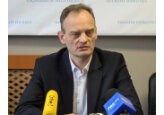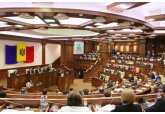
The government has approved the National Economic Development Strategy 2030 and will achieve an annual GDP growth rate of 8%.
According to the Ministry of Economic Development and Digitalization, in particular, through the implementation of this strategy, it is planned to achieve an accelerated economic growth of 5% on average in 2024-2026, and 8% on average in 2027-2030. The share of foreign direct investment (FDI) in GDP is planned to increase from 34.1% in 2022 to 40% by 2026 and to 55% by 2030. At the same time, the share of FDI in processing industries and ICT relative to GDP is planned to increase from 5.3% in 2022 to 6.5% by 2026 and to 8.5% by 2030. It is expected that the share of GDP produced outside Chisinau municipality in total GDP is expected to increase from 40% in 2022 to 42.5% by 2026 and to 46% by 2030. The share of renewable energy sources in total consumption will increase to 25% by 2026 and to 27% by 2030. Exports are planned to grow at an average annual rate of 20% in 2024-2026 and 15% in 2027-2030. Investments of enterprises financed by state-guaranteed loans will amount to 5 billion lei by 2026 and to 10 billion lei by 2030. The share of Moldova's exports in world trade is expected to increase from 0.014% in 2022 to 0.018% in 2026 and to 0.020% in 2030. The share of national roads in “good” and “very good” condition is expected to increase from 31.54% in 2022 to 50% in 2026 and to 75% in 2030. The share of gross value added in processing industries relative to GDP will increase from 9% in 2022 to 11% in 2026 and to 13% in 2030. The share of innovative enterprises in the total number of enterprises will increase to 15% in 2026 and to 18% in 2030. Economic Development and Digitalization Minister Dumitru Alaiba said that the National Strategy of Economic Development until 2030, approved by the government, represents a vision of Moldova's sustainable economic development. The authorities want to achieve an accelerated economic growth and, through this strategy, aim at an annual GDP growth of 8%. He said that the approved important document will guide Moldova towards a prosperous economy for its citizens, stimulating innovations and creating the most optimal environment for business development. The document envisages the redefinition of the national economic development policy, in order to make a more efficient use of the existing resources and opportunities in the context of the EU accession process, in order to achieve a faster, more inclusive and more sustainable economic growth. The National Economic Development Strategy 2030 contains a number of important objectives. In particular, it is about creating a friendly environment for entrepreneurs and investors by eliminating bureaucracy and providing support to create a favorable business climate. These measures are planned to be applied efficiently and transparently for all entrepreneurs and investors. It is also planned to develop the service sector with a focus on high-value services such as IT, consulting and tourism, which can bring significant benefits to the economy. There is also the task of stimulating the innovation industry. It is about supporting innovative and technological companies, which can contribute to Moldova's economic growth, international competitiveness and the creation of well-paid jobs. The sectoral agency also considers it important to create an innovation-friendly ecosystem, including financing, research and development infrastructure, as well as cooperation between the public and private sectors. In addition, steps will be taken to transform the state with a strong and green economy. Achieving this goal involves adopting policies and practices that promote sustainable development and environmental protection. Special attention will also be paid to digitalization. It is expected that integrating digital technologies into all aspects of the economy can improve efficiency and competitiveness. “All this will create opportunities for people to find well-paid jobs, to get bigger incomes and improve the life quality. Moldova will turn into a state with a sustainable, inclusive, green, digital, crisis-resistant economy and fully prepared for EU accession,” said the Ministry of Economic Development and Digitalization, which will be in charge of putting the strategy into practice, as the body responsible for developing policies in the economic field. // 05.06.2024 - InfoMarket.







